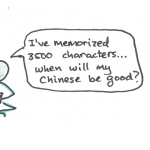Articles tagged with ‘Guest post’
-
Improving your Chinese while watching TV shows
Watching TV is a great way to learn languages. It combines lots of useful Chinese words and phrases while providing rich context because of the visual nature of the medium. This article introduces ideas for how to learn, as well as recommended TV shows for beginner, intermediate and advanced learners.
Read → -
The nine principles of learning (and the mistakes from failing to follow them)
In 2014, Scott Young spent 100 days learning Chinese, after which he was able to speak freely on a wide range of topics, as well as pass HSK 4. Since then, he’s continued exploring effective learning and has now published a book called Ultralearning. He hasn’t abandoned Chinese, though, and in this article, he discusses nine important principles for effective learning and how they relate to studying Chinese.
Read → -
A student’s guide to comprehension-based learning
In this third and final article, the focus is on how students can make their own learning comprehension-based, with or without a teacher. It draws from the principles and ideas of the previous articles and allows you to apply these to your own learning.
Read → -
The benefits of a comprehension-based approach for teaching and learning Chinese
Diane Neubauer continues her series of guest articles about comprehension-based approaches to teaching and learning Chinese. In this the second part, the focus is on principles and motivations for using a comprehension-based method. There’s also an overview of teaching practices that fall into this category.
Read → -
An introduction to comprehension-based Chinese teaching and learning
This guest article by Diane Neubauer introduces comprehensible input and what it can do for us as language learners and teachers. It’s the first part of a series of three articles, focusing on comprehension-based methods for learning and teaching.
Read → -
How to fake sounding like a native Chinese speaker
Have you ever wanted your Mandarin to sound more advanced than it is? In this guest article, David Moser tells us how to fake sounding like a native Chinese speaker. While tongue-in-cheek, some of the advice applies even if you’re after the real thing!
Read → -
The new paperless revolution in Chinese reading
In this (guest) article, David Moser writes about the importance of going digital in your Chinese reading practice. With the right tools and the right approach, learning to read Chinese becomes much easier. While it still requires time and dedication, it’s no longer as hard as it used to be. Don’t miss out on the paperless revolution in Chinese reading!
Read → -
Why you should think of characters in terms of functional components
Learning about the structure of Chinese characters can help enormously when learning the language. This article is an in-depth look at functional components, i.e. parts of characters that give the whole character either its meaning or its sound. It’s also a discussion about why we really shouldn’t talk so much about radicals when learning Chinese.
Read → -
A language learner’s guide to reading comics in Chinese
This article is a guide to reading comics in Chinese, suitable for beginners as well as those who already have some experience. Reading comics is an excellent way of attacking the Great Wall of Chinese (the daunting effect of seeing a whole page of text and not knowing what to do). It’s also fun, which is arguably the most important thing.
Read → -
Approaches to reading in Chinese
Reading is one of the best ways of picking up new vocabulary once we reached an intermediate or advanced level, but it’s also necessary to read a lot to be able to write Chinese properly. Reading also enables us to understand word usage and brings us closer to the culture behind the language. This article is focused on reading in Chinese, including reading method, book selection, benchmarking, vocabulary and more.
Read →









